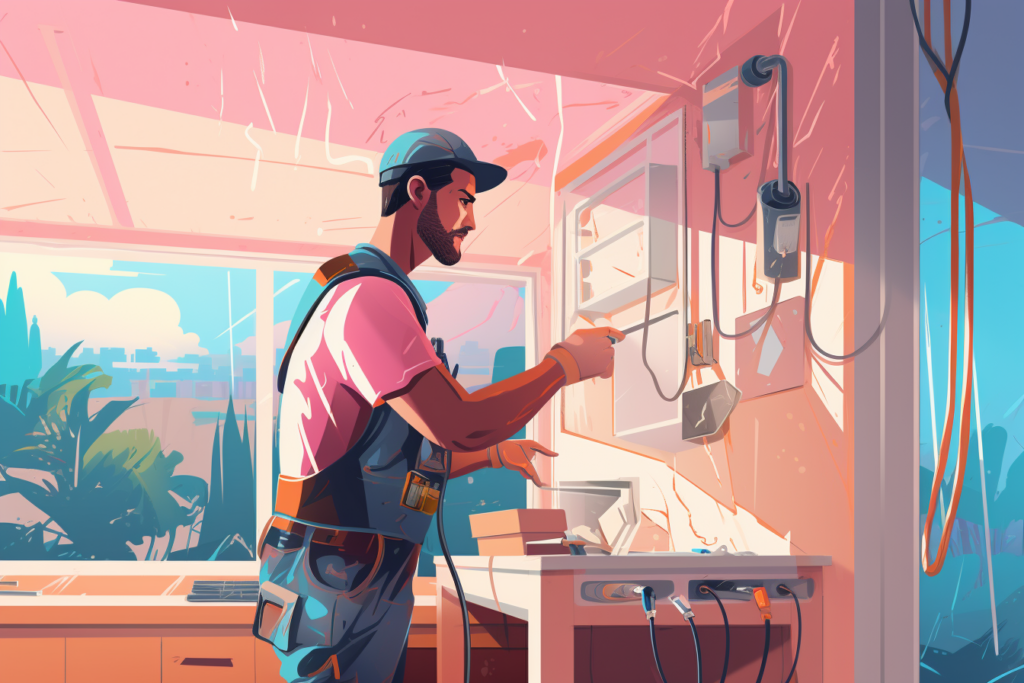Plain and simple, electricity can be dangerous if not handled properly. As a homeowner or renter, understanding the basics of electrical safety and maintenance is crucial. This guide is designed to help beginners navigate the complexities of their home electrical system safely and effectively.
Understanding the Basics
Before attempting to do any electrical work yourself, it is crucial to understand the basics.
Know Your Electrical Panel:
- The control center for your home’s electricity is in the breaker box aka electrical panel. Familiarize yourself with its layout and know which breaker controls which part of your home.
Learn the Signs of Electrical Problems:
- Be alert to signs like frequent breaker trips, flickering lights, buzzing sounds from outlets, or a burning smell, as these can indicate electrical issues.
Routine Safety Checks
No matter what you are doing, safety is your number one priority. Make sure to routinely do safety checks for any electrical work or outlet in your home.
Regularly Inspect Power Cords and Plugs:
- Look for visible signs of wear and tear. Replace damaged cords immediately, as theycan be a fire hazard.
- Ensure that all plugs fit securely in outlets. Loose plugs can lead to arcing and overheating.
Test and Maintain GFCIs and AFCIs:
- These devices help prevent electric shocks (GFCI) and electrical fires (AFCI). Regular testing ensures they function properly.
Safe Usage of Appliances and Devices
Too many outlets plugged in at once is definitely possible. It is important to be conscious of overloading any outlet, especially during the holidays or when multiple people use the same outlet (i.e., kids charging phones, tablets, headphones, etc., in a power strip).
Manage Appliance and Outlet Loads:
- Avoid overloading outlets with too many appliances, which can overheat electrical circuits.
- Understand the capacity of your circuits and distribute high-energy-consuming appliances accordingly.
Use Extension Cords Wisely:
- Extension cords should be a temporary solution. Avoid using them as permanent fixtures, as they can become potential tripping hazards and fire risks.
DIY Electrical Work: Know Your Limits
An inexperienced homeowner can do DIY electrical work, but proceed cautiously and know when to ask for help.
Safety First:
- Turn off the power at the breaker box for DIY electrical work to prevent electric shock.
- It’s always safer to consult a professional electrician if you need clarification on any electrical task.
Childproofing and Pet Safety
Kids and pets love to mess with things they aren’t supposed to, including electrical outlets.
Electrical Safety for Kids and Pets:
- Use tamper-resistant (TR) outlets to prevent children from inserting objects.
- Keep wires and cords out of reach of pets to prevent chewing and potential shock.
Fire Prevention and Response
Regularly Check Smoke Detectors:
- Install smoke detectors in key areas, especially near bedrooms and the kitchen.
- Test them monthly and replace batteries annually or as needed.
Electrical Fire Safety:
- Keep a class C fire extinguisher (for electrical fires) accessible in your home.
- Don’t hesitate to call the fire department in case of an electrical fire, even if you think the fire is contained.
Energy Efficiency and Conservation
Adopt Energy-Saving Habits:
- Unplug chargers and appliances when not in use, as they can draw power even when turned off.
- Consider upgrading to energy-efficient appliances and LED lighting.
Emergency Preparedness
It is never too early to start being prepared for an emergency.
Be Prepared for Power Outages:
- Keep flashlights and batteries easily accessible in case of a power outage.
- Consider investing in alternative power sources for emergencies, like a generator.
10 Common Mistakes Made When Doing DIY Electrical Work

DIY electrical work can be tempting for those who want to save money or enjoy the challenge of home improvement projects. However, electrical work is inherently risky and requires a certain level of expertise and caution. Here are some common mistakes people often make when attempting DIY electrical projects:
1. Lack of Knowledge and Understanding
- Underestimating Complexity: Many people underestimate the complexity of electrical work and overestimate their own skill level. Electrical systems are known to be intricate and require a thorough understanding to work on safely.
- Ignoring Code Requirements: Every region has specific electrical codes that are designed for safety. DIYers often overlook these codes, which can lead to dangerous installations and problems with future home inspections.
2. Inadequate Safety Precautions
- Skipping Power Shutdown: Failing to turn off the power completely before starting work is a critical mistake. This can lead to electric shocks or even electrocution.
- Inappropriate Protective Gear: Not using proper safety equipment like insulated gloves and safety glasses can increase the risk of accidents.
3. Incorrect Tool Usage
- Using the Wrong Tools: Using inappropriate tools for electrical work can damage your home’s electrical system and increase the risk of injury.
- Improvised Tools: DIYers sometimes use improvised or makeshift tools instead of the proper equipment, which is unsafe for electrical work.
4. Poor Wiring Practices
- Loose Connections: Not securing connections properly can lead to loose wires, resulting in short circuits or fires.
- Overloading Circuits: Adding too many outlets or lights to a single circuit can overload it, increasing the risk of overheating and fire.
- Incorrect Wire Sizes: Using the wrong size or type of wire can cause overheating and electrical fires.
5. Neglecting Grounding and Bonding
- Improper Grounding: Grounding is essential for safety in all electrical systems. DIYers often make mistakes in grounding electrical circuits, which can be extremely hazardous.
6. Inadequate Junction Boxes
- Not Using Junction Boxes: Junction boxes protect wire connections. Failure to use them, or misusing them, can lead to exposed wire connections, increasing the risk of shock or fire.
7. Rushing Through the Project
- Haste and Shortcuts: Rushing through an electrical project or taking shortcuts to save time can lead to serious oversights and mistakes.
8. Misdiagnosing Electrical Problems
- Incorrect Diagnostics: Without proper knowledge, it’s easy to misdiagnose an electrical issue, leading to incorrect or unnecessary repairs.
9. Overconfidence and Overreaching
- Taking on Complex Projects: Some electrical projects, like rewiring a house or changing the service panel, are too complex for the average DIYer and should be left to professionals.
10. Lack of Post-Installation Testing
- Skipping Checks: Failing to test the installation properly after completing electrical work can leave unnoticed issues that might lead to bigger problems.
Electrical safety and maintenance are vital components of responsible home ownership and tenancy. Regular inspections, cautious usage of appliances, understanding your electrical system, and knowing when to call professionals are key to preventing accidents and maintaining a safe home environment.
You might also be interested in: How To Change Your Smoke Detector Battery [And 5 Safety Tips]




